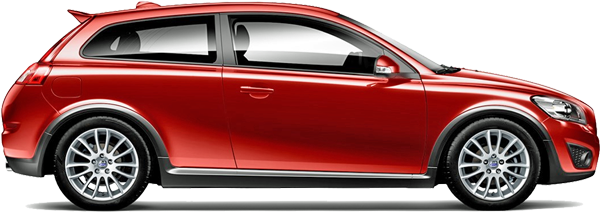The Comparative Analysis :
Volvo V40 D2 ECO Geartronic (15 - 16) vs. Volvo C30 D5 Geartronic (09 - 10)
€ 27,700

€ 28,200

€ 27,700
Base Price ⓘBase price of a new vehicle with standard equipment in Germany at market launch.
€ 28,200
ⓘBase price of a new vehicle with standard equipment in Germany at market launch. Price Info
Vehicle Dimensions
The dimensions of these vehicles differ slightly. The V40 D2 ECO is 10.3 cm longer, 0.1 cm wider and 2.7 cm lower than the C30 D5.
V40 D2 ECO
C30 D5
1420
1783
2041
1447
1782
2039
1783 mm
Width
1782 mm
2041 mm
Width Incl. Mirrors
2039 mm
1420 mm
Height
1447 mm
2647
4369
2640
4266
4369 mm
Length
4266 mm
2647 mm
Wheelbase
2640 mm
Vehicle Weight
V40 D2 ECO
C30 D5
1577 kg
Kerb Weight
1477 kg
1995 kg
Gross Vehicle
Weight
Weight
1900 kg

Weight Difference:
100 kg
6.34 %

General
V40 D2 ECO
C30 D5
M
Generation
M
Hatchback
Car Body Style
Hatchback
Diesel
Fuel Type
Diesel

Front-wheel drive
Drive
Front-wheel drive

6-speed automatic transmission
Transmission
5-speed automatic transmission
Engine
V40 D2 ECO
C30 D5
Straight-four diesel engine with turbocharger
Engine Type
Straight-five diesel engine with two turbochargers (biturbo)
D4204T8
Engine Code
D5244T8
4
Valves
4
4
Cylinders
5
1969 CC
Engine Capacity
2400 CC
118 bhp
at 3750 rpm
Power
178 bhp
at 4000 rpm
V40 D2 ECO
118 bhp
178 bhp
C30 D5
280 NM
at 1500 rpm
Max. Torque
350 NM
at 1750 rpm
V40 D2 ECO
280 NM
350 NM
C30 D5
Performance
V40 D2 ECO
C30 D5
118 mph
Maximum Speed
137 mph
10.5 sec
Acceleration 0 to 62 mph
8.4 sec
62 mph
62
mph
mph
146 m
0.000 sec

V40 D2 ECO
62 mph
62
mph
mph
117 m
0.000 sec

C30 D5
▶ REPLAY
13.36 kg/bhp
Weight-to-Power Ratio
8.3 kg/bhp
V40 D2 ECO
13.36 kg/bhp
8.3 kg/bhp
C30 D5
Fuel Economy / Emissions
V40 D2 ECO
C30 D5
Fuel Economy
76 mpg
combined
41 mpg
V40 D2 ECO
76 mpg
41 mpg
C30 D5
66 mpg
city
30 mpg
83 mpg
motorway
52 mpg
40 L
Fuel Tank Capacity
60 L
672 mi
Range
541 mi
V40 D2 ECO
672 mi
541 mi
C30 D5
Environmental Impact
76.1 kWh
Total Energy Consumption
per 100 miles ⓘThe total energy consumption per 100 miles is the amount of energy consumed by a vehicle when burning fuel or using electricity per 100 miles (final energy), and the energy required to produce the appropriate amount of fuel or electricity (primary energy).
per 100 miles ⓘThe total energy consumption per 100 miles is the amount of energy consumed by a vehicle when burning fuel or using electricity per 100 miles (final energy), and the energy required to produce the appropriate amount of fuel or electricity (primary energy).
141.9 kWh
V40 D2 ECO
76.1 kWh
141.9 kWh
C30 D5
Euro 6b (NEFZ)
Emission Standard
Euro 4
97 g/km (NEFZ)
CO2 Emissions
182 g/km (NEFZ)
Practical Convenience
V40 D2 ECO
C30 D5
5
Doors
3
5
No. of Seats
4
418 kg
Maximum Payload
423 kg
335 L
Boot Capacity
278 L







1032 L
Boot Capacity (Seats Down)
921 L




















